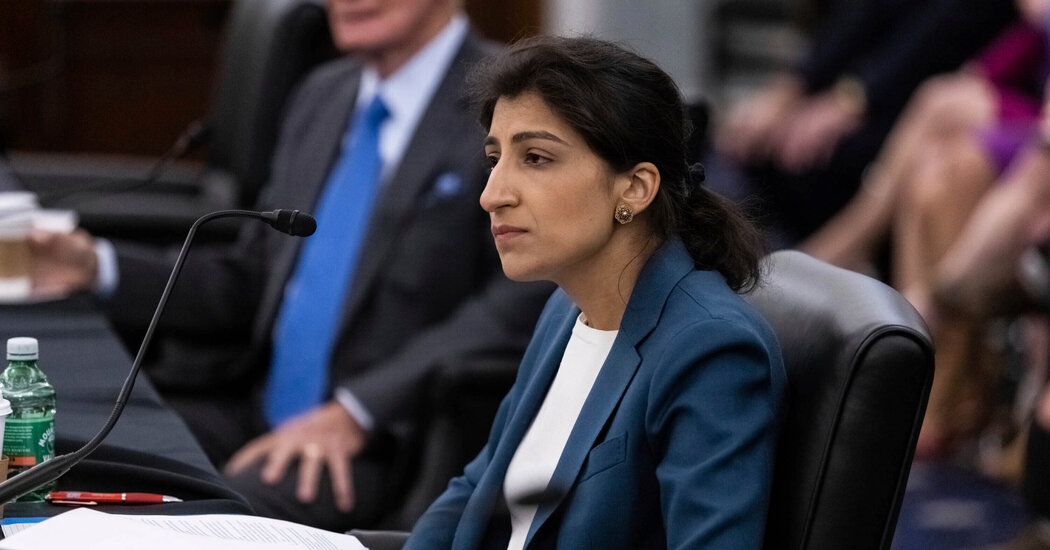
WASHINGTON — Nearly a year into her job as chair of the Federal Trade Commission, Lina Khan hasn’t quite made the splash that many expected.
She was appointed by President Biden to shake up an agency that has long quivered at the power of the tech giants, but her record has lacked a signature action against the industry. Most notably, Ms. Khan, who has contended that there is an antitrust argument against Amazon, has not brought such a monopolization case against the e-commerce giant.
Republican lawmakers and the U.S. Chamber of Commerce have also fought her at every turn, describing her as anti-business and overbearing. At the F.T.C., staff morale has plummeted, according to a recent survey, and senior officials have left.
But a third Democratic commissioner was recently confirmed to the five-member agency, giving Ms. Khan, 33, a majority. In a 20-minute interview this week over Zoom, she said she was preparing to unleash an aggressive agenda and “the best is yet to come.”
This interview has been lightly edited and condensed.
Now that you have a majority, what are your top two or three priorities out of the gate?
There are key signature actions that are already underway that I think will further come to fruition over the next year.
We initiated a review of the merger guidelines (internal rules that the F.T.C. follows in its reviews of mergers) with the Justice Department and expect to update these guidelines to ensure that they’re fully adhering to existing law and also accurately reflecting existing market realities of how companies are engaging in mergers to build and illegally acquire market power.
We’re contemplating rule makings, including with regards to commercial surveillance practices, as well as with regards to unfair methods of competition. We’re going to continue enforcing the law vigorously, prohibiting illegal mergers, prohibiting unlawful business practices.
Is your focus more on transforming the agency as opposed to bringing big enforcement actions forward?
I don’t see any of these as mutually exclusive. We already filed major lawsuits. We’ve sued to block the Nvidia-Arm transaction. We sued to block Lockheed’s acquisition of Aerojet, which was the first time in decades the government has sued to block a merger in the new defense industrial space. We’ll continue to build on that.
You can expect to see big lawsuits. We’re definitely focusing our resources on litigating. With limited resources, we’re having to focus on what we see as some of the biggest problems. I’ve made clear that focusing on dominant actors in markets is going to be a focus.
Along those lines, how important is it to you to bring a lawsuit against Amazon?
We can’t comment on any specific companies or specific enforcement actions, but inasmuch as we are focusing on dominant actors in the market, it’s no secret that some of these digital incumbents have really only expanded and become more prevalent and more powerful during the pandemic.
I think we’ve seen time and time again that when you have a company that has captured control over a key artery of commerce, that control can be used unlawfully. That was partly what animated the passage of the antitrust laws where Congress recognized that the dominance of the railroads and their control over key arteries of commerce was really allowing these small number of companies to pick winners and losers in our economy to shape the trajectory of innovation.
Those are the same types of principles that we are considering, and that’s animating our work now.
Instead of blocking or approving deals, you’ve sent some letters to companies saying if they close their deals, they are doing so at the risk of your agency coming back to block them later. Should we expect you to revisit deals that have closed?
We have 30 days after parties make a filing with us to determine if we’re going to do a deep-dive investigation. Thirty days is an extremely short amount of time when you have deals that are so large and that are so complicated. And so there are going to be instances, especially when you have the type of surge in merger filings that we did last year, that by the end of the 30 days our staff has not faithfully been able to come to a clear determination.
And so in those instances, we signaled the parties were needed, that our investigation is ongoing, and they shouldn’t take the lapse of that expiration period as a sign of somehow the F.T.C. approving the deal.
We retain the authority and the ability to challenge consummations after the fact. Our inaction is never signaling that we approve a deal.
Can your work really rein in tech, which often outpaces rule-making and policy?A lot of the work that we’ve done has really broadened the aperture for how we’re understanding and recognizing and diagnosing harm. We’re really trying to be forward looking, anticipating problems and taking swift action, rather than just, you know, 10 years down the line realizing, oh, there was a big problem and a big moment that we missed.
I think this goes back to being attentive to these next-generation technologies and next-generation innovations in nascent industries across sectors. Those can really help us tackle problems at the inception.
What do you make of a recent survey of agency employees that shows lower morale?
That’s something that I take incredibly seriously. I’ll say as a general matter, you know, this is a moment of incredible change at the agency, and we know that moments of change can be difficult.




